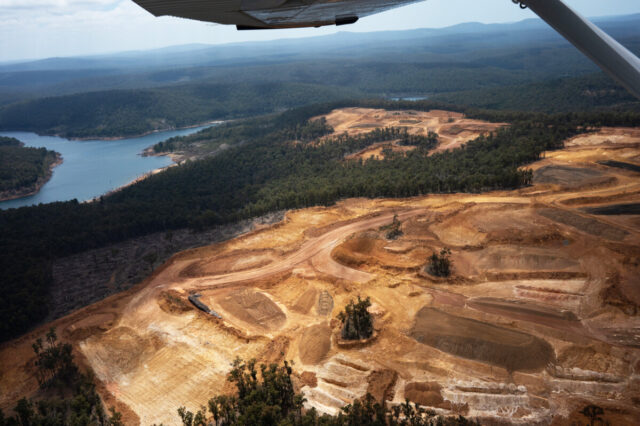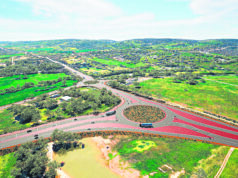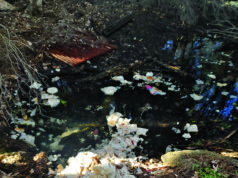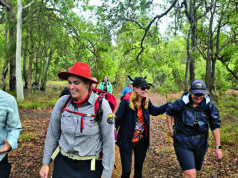The Premier and Environment Minister have effectively put the independent environmental watchdog on a leash ahead of its unprecedented decision on Alcoa’s bauxite mining operations.
Premier Roger Cook announced last week that an exemption will be provided for the US-based mining giant to continue operations ahead of the Environmental Protection Authority’s (EPA) looming determination on whether to more robustly “assess” the company’s activities in the Darling Ranges.
Under the Environmental Protection Act, a decision to assess would immediately put a stop to Alcoa’s mining operations.
On Monday morning, the EPA announced it had decided to assess and would “comprehensively scrutinise” the company’s practises as part of its latest five-year MMP.
The exemption announced by the government allows Alcoa to continue regardless.
Last week the WA government also approved Alcoa’s latest five-year mining management plan (MMP) to continue operations on its Huntley and Willowdale bauxite mines until 2027.
Alcoa’s mining, refinery and associated activities approvals are managed through a 60-year-old State Agreement – unlike other resources projects in WA, which are wholly regulated through the Environmental Protection Act 1986 and the Mining Act 1978.
Under the current historical agreement, Alcoa has been required to submit its mining plan each year to the state-government’s Mining and Management Program Liaison Group (MMPLG), with final approval coming from the Minister for State Development.
But the MMPLG has been refusing to approve Alcoa’s plan due to dangers of contamination to Perth’s drinking water supply in the Serpentine basin.
Premier Roger Cook justified last week’s announcements by saying they were protecting thousands of local jobs.
Around 1200 of those jobs are at the company’s Kwinana refinery, in the Premier’s own electorate, which were threatened in October when Alcoa chief executive told Wall Street analysts, they might close the refinery.
“Every project in WA should be subject to the same rigorous environmental approval system, but legacy issues mean Alcoa is yet to move to contemporary approvals,” Premier Cook said.
“Alcoa is a major employer and contributes significantly to our regional economies, so it’s important we safeguard local jobs while this transition to a modern approvals framework takes place.
“This transitional framework allows us to support local jobs while strengthening protections for our environment, and lays the groundwork for a long-term approvals regime for Alcoa that meets modern standards.”
The government has said the exemption comes with a range of conditions including:
• reconstituting an independent committee to provide expert advice on hydrology matters;
• requiring a staged exit and rapid stabilisation and rehabilitation of critical risk areas;
• immediate hand back of more than 1200ha forest previously approved for clearing, and an 800ha cap on annual clearing approvals; and
• requiring Alcoa to publish its MMP and associated reports, in the interest of transparency.

Alcoa’s vice president operations for Australia Matt Reed welcomed the announcement.
“We are absolutely focused on operating in line with these new requirements and evolving community expectations,” he said.
“They mean we can continue to build on our 60 years of economic value creation, employment, and community support in WA while transitioning to more contemporary approvals.”
But the news has shocked advocates for the environment.
“This exemption order will allow Alcoa to keep destroying ancient, highly biodiverse jarrah forests. We know that it is impossible to regrow these forests after clearing and mining. Once they’re gone, they’re gone forever,” WA Forest Alliance’s Jess Beckerling said.
Deputy Chair for the Jarrahdale Forest Protectors Jeff Bremer said he was “deeply disappointed” by the premier’s decision which he said undermines the independent authority of the EPA.
“Whether you’re an environmentalist or not, anyone should be disgusted by the lack of good governance and due process in this decision,” Dr Bremer said.
“This has cut right across the advice of the MMPLG in order to enable mining to continue for the next five years.
“And it makes the assessment by the EPA completely irrelevant, continuing a long history of bullying the public service.
“One really has to ask where the government is getting their advice.”
EPA Chair Professor Matthew Tonts acknowledged the Minister for Environment’s decision to respond to a potential EPA assessment decision with legislation allowing Alcoa to continue operating, but said it wouldn’t stop them from doing their job.
“I don’t consider that this particular legislative exemption will prevent the EPA from rigorously undertaking its assessment and providing recommendations to the Minister for Environment,” he said.
But this is not the first time the government has come under fire for kneeling on the back of environmental regulators.
According to a December 2022 report by the Auditor General, planned inspection programs by the Department of Mines, Industry Regulation and Safety, and the Department of Water and Environmental Regulation have “shrunk by 60 percent or more over the last five years” despite growth in the mining sector.
“Both entities have also shifted resources and focus to deal with a backlog of approvals,” the report said.
Jess Beckerling said this saga sets a “dangerous precedent” for future mining proposals.
“The developments today are horribly Orwellian and by no means the end of this story. WA Forest Alliance will be working hard in 2024 to hold Alcoa to account and protect the remaining high conservation value forests along the Darling Scarp,” she said.














